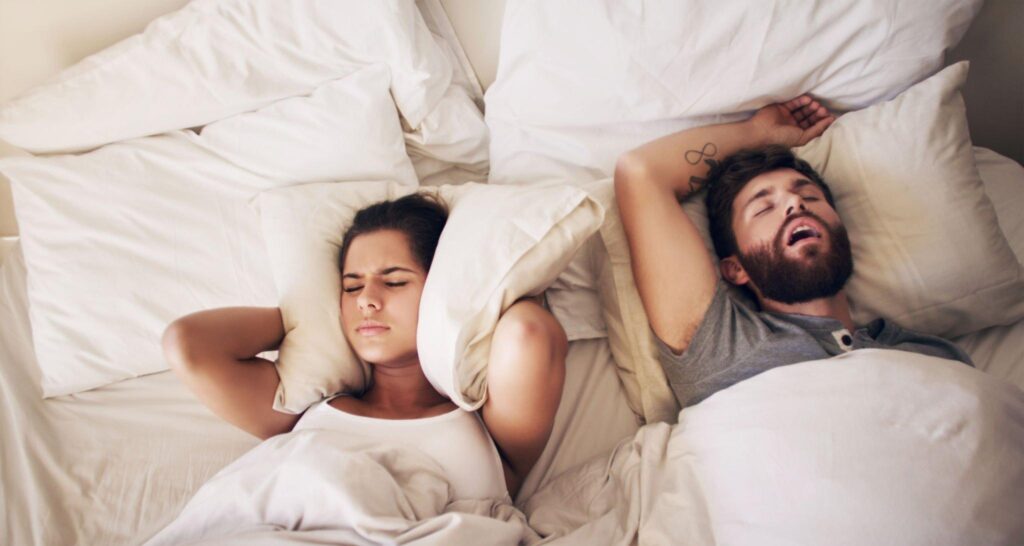
Snoring is not only unhealthy for you, but it is also disturbing to your partner. You also do not have to live with it as you can take any of the steps mentioned above. Get the help that you need, and you will be able to sleep better at night as well as stay healthy in the long term.
Snoring is loud and disturbing to the person listening to it but for the person snoring, it is a non-deliberate and unconscious act. Snoring is an issue that results from the blocking or the airway while sleeping. When we sleep, the airway becomes narrower because of the relaxation of the airway muscles. Therefore, as we try to breathe through the narrow passage, the soft tissues along the airway start to vibrate. This vibration leads to snoring.
Symptoms of Snoring
The most obvious symptom of snoring is the noisy breathing that occurs during sleep. A lot of people are not even aware that they snore because they do not take note of the fact that they have the potentials to snore. Here are some other symptoms;
• Excessive fatigue and sleepiness during the day.
• Early morning headaches.
• Memory loss and inability to concentrate.
• Incessant bathroom use through the night.
• Depression, mood-swings and short temper.
Factors that increase the risk of snoring
The likelihood of snoring in one person varies from that of another person and for some people it is higher than others. A larger number of men snore more than women although a good number of women snore. Snoring is more prevalent with pregnancy. Also, both men and women are liable to snore as they grow older. Below are some of the other factors that increase the risk of snoring.
• Overweight.
• Consumption of alcohol.
• Smoking.
• Nasal problems like nasal congestion or deviated septum.
• Hereditary cases of snoring.
For some people, in the absence of these risk factors, the shape of their neck, airway or head may be responsible for their snoring.
How is snoring connected to Sleep Apnea?
Sleep apnea is a sleep disorder which snoring is its primary symptom. Although everyone who snores is not suffering from sleep apnea, sleep apnea is associated with snoring, and it requires medical attention. A lot of people have sleep apnea but are not aware, and even though snoring is not exactly healthy, it is not a definite sign that a person has sleep apnea. For someone who has sleep apnea, their snoring may have pauses and loud gasps, they may have intermittent snores and make snorting or choking snores while snoring. Even the person suffering from it may not know, but people around them will observe these signs and call their attention to it. Pay attention to these symptoms of obstructive sleep apnea;
• Extremely loud snoring.
• Observed pauses in breathing, making choking and snorting sounds during sleep
• Early morning dry mouth and headache.
• Feeling sleepy during the day after a complete 7-8 hours of night sleep.
• Irritability, mood swings, depression, and anxiety.
The fact that there is a connection between sleep apnea and snoring is the primary reason why you should pay attention to your snoring. Sleep apnea without proper medical care can lead to some other severe medical conditions such as type 2 diabetes or cardiovascular disease.
How to treat Snoring.
There are lots of effective treatment options for snoring and whichever option you choose, never allow a snoring problem go unattended. It could cause further health problems or lead to an even more severe sleep disorder. The following tips can help you prevent or treat snoring.
• Shed some weight.
Obese and overweight people have excess tissues in their throat which clogs the free flow of air through their airways. Losing weight will get rid of these tissues and reduce snoring.
• Change your sleeping position.
Sleeping on your back with your face up makes your tongue fall backward into your throat thereby making your airway narrower. You can prevent this by changing how you sleep. Try sleeping on your side and maintain that position through your sleep. If you find it hard to keep sleeping on your side, see a tennis ball in the back of your pajama top.
• Sleep with your head raised.
Try sleeping with your head raised by raising the head of your bed by 4 inches.
• Wear nasal strips
Wear an adhesive nasal strip on the bridge of your nose so that your nasal passage can get wider and there will be a free flow of air. You can also use a nasal dilator which is applied to the external parts of the nose to make breathing easier.
• Treat nasal congestion immediately.
You should never leave cases of nasal congestion of deviated septum untreated. It limits the flow of air through your nose and makes you breathe through your mouth thereby leading to snoring.
• Reduce your consumption of alcohol, sedatives, and depressants.
Alcohol and sedatives make your central nervous system depressed, and your muscles relaxed. Do not take any of these things within two to three hours of going to bed. If possible, avoid them at all.
• Stop Smoking.
Smoking itself is not exactly a healthy habit but quitting smoking can help reduce snoring and help you stay healthy
• Sleep adequately
The recommended sleep duration of sleep for adults is seven to eight hours while for children not yet in school, it should be between 10 and 14 hours. Teenagers should sleep for 8 to 10 hours every day, and school children should get between 9 and 12 hours of sleep daily.
• Use anti-snore oral devices.
The anti-snore device is a mouthpiece that goes into the mouth and adjusts the mouth and throat in a way that the airway is open. Your dentist will help you optimize the fit of this device, and you need to see a sleep specialist to help make sure the device is working correctly.
• Continuous Positive Airway Pressure (CPAP)
This is a mask that is connected to a pump. You wear the mask on your face, and the pump sends pressurized air through a hose into your airway so that it doesn’t get blocked as you sleep. CPAP is an effective treatment method for severe cases of obstructive sleep apnea.
• Surgery
You can undergo surgery to open up your upper airway so that it never gets closed up while you sleep.




